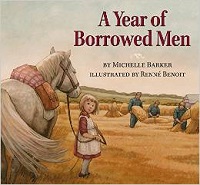| ________________
CM . . .
. Volume XXII Number 9. . . .October 30, 2015
excerpt:
In this picture book based on real events, young Gerda recalls the year her German family took in three French prisoners of war during the final months of World War II. Gerda and her family consider these men “borrowed”—sent to help them keep their farm operating because Gerda’s father and brother have been “borrowed” by the German army. Mummy and her daughters are supposed to treat Gabriel, Fermaine, and Albert as the enemy; instead, they choose kindness, making sure the men are well fed and enjoy some special treats such as a Christmas tree. The prisoners must live in the pig kitchen (a cold, smelly room where potatoes are cooked for the pigs), and the one time the family invites them inside the house to share a warm meal, someone alerts the police who angrily interrogate Mummy. After the war ends, the three soldiers gladly return to their homes in France, but it is clear that the kindness shared by the Schlottke family and the soldiers has made a terrible situation somehow more bearable. Based on the childhood memories of Gerda Schlottke, the author’s mother who immigrated to Canada after the war, the text is augmented with family photographs and an appended note. The choice of Gerda as narrator adds to the story’s appeal for Gerda is unaware of the many horrors associated with this war; for her, it is simply a difficult time without her father. Benoit’s realistic watercolour, coloured pencil, and pastel illustrations employ an earthy palette that brings this heartfelt story to life. This makes A Year of Borrowed Men a natural choice for Remembrance Day story hours, but the overarching theme of kindness in a time of mistrust and suspicion gives the story a universal appeal that will likely spur many thoughtful discussions. Highly Recommended.
Kay Weisman works as a youth services librarian at West Vancouver Memorial Library and chairs the Children’s Literature Roundtables of Canada’s Information Book Award.
To comment on this title or this review, send mail to cm@umanitoba.ca.
Copyright © the Manitoba Library Association. Reproduction for personal use is permitted only if this copyright notice is maintained. Any
other reproduction is prohibited without permission.
CM Home |
Next Review |
(Table of Contents for This Issue - October 30, 2015.)
| Back Issues | Search | CM Archive
| Profiles Archive |
